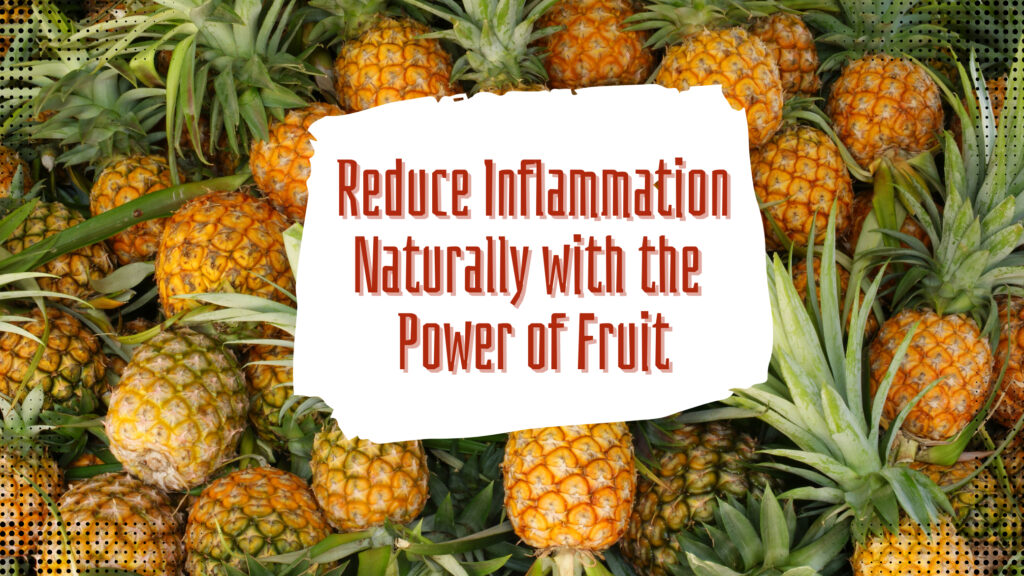Pineapple, rich in bromelain, vitamin C, and antioxidants, helps reduce chronic inflammation, benefiting conditions like arthritis, digestive issues, and sinus health.
Inflammation is a natural response by the body to infection or injury, but when it becomes chronic, it can lead to a variety of health issues, such as joint pain, digestive problems, and even heart disease. While medications are often used to control inflammation, many people are seeking natural remedies to fight inflammation naturally.
One of the most powerful yet commonly overlooked ways to reduce inflammation is through the consumption of fruits. Pineapple, a widely available fruit, can be a game-changer in your quest to fight inflammation naturally.
Science Behind Inflammation and Pineapple’s Role
What is Inflammation?
Inflammation is the body’s natural response to infection, injury, or toxins. It helps the body heal and fight off pathogens. When inflammation persists for extended periods, it can become chronic and damage tissues, organs, and even DNA. Chronic inflammation is linked to conditions like arthritis, heart disease, and autoimmune disorders. To reduce inflammation naturally, need to incorporate anti-inflammatory foods into diet, and pineapple is one of the most effective foods that can provide significant relief.
Anti-Inflammatory Enzyme: Bromelain in Pineapple
One of the key reasons pineapple is so effective at reducing inflammation is its content of bromelain, an enzyme that has strong anti-inflammatory properties. Bromelain has been shown to reduce swelling, alleviate joint pain, and even help with digestion. This enzyme is particularly effective in fighting chronic inflammation naturally by targeting the root causes of inflammation in the body.
How Chronic Inflammation Affects the Body
Chronic inflammation can damage healthy cells and tissues in the body, leading to long-term health issues. Common signs include joint pain, fatigue, and digestive problems. By incorporating inflammation-fighting foods like pineapple into diet, you can help reduce the long-term risks associated with chronic inflammation, including inflammation-related diseases like arthritis and cardiovascular disease.
Key Nutrients in Pineapple That Help Fight Inflammation
Bromelain: A Natural Anti-Inflammatory Powerhouse
The enzyme bromelain found in pineapple is not only effective in reducing swelling but also plays a role in breaking down fibrin, a protein that contributes to inflammation. This can provide much-needed inflammation relief without the side effects often associated with pharmaceutical drugs. Adding pineapple to your diet is a delicious and natural way to combat joint inflammation and other related health issues.
Vitamin C: Boosting Immunity and Reducing Inflammation
In addition to bromelain, pineapple is rich in vitamin C, an essential nutrient known for its ability to reduce inflammation. Vitamin C is a potent antioxidant that helps fight oxidative stress in the body, which can trigger or worsen inflammation. Regular intake of anti-inflammatory fruits, including pineapple, can help reduce swelling naturally and promote a healthy immune system.
Antioxidants in Pineapple: Combatting Oxidative Stress
Pineapple contains various antioxidants, including flavonoids and phenolic compounds, which help combat oxidative stress and inflammation. Antioxidants neutralize free radicals that cause damage to cells and tissues, leading to inflammation relief. Including anti-inflammatory foods to eat like pineapple in your diet helps prevent inflammation from spreading and potentially causing long-term damage.
Pineapple and Its Effect on Common Inflammatory Conditions
Managing Arthritis Pain with Pineapple
Arthritis is one of the most common conditions linked to chronic inflammation, and it can be debilitating. The bromelain in pineapple has been found to help reduce joint inflammation and alleviate pain. Consuming pineapple regularly may provide natural remedies for inflammation, offering a more holistic approach to managing arthritis symptoms compared to medications alone.
Easing Digestive Inflammation Through Pineapple
Pineapple also has benefits for those suffering from digestive issues like inflammatory bowel disease (IBD) or irritable bowel syndrome (IBS). Bromelain’s ability to break down proteins can soothe digestive inflammation, allowing for easier nutrient absorption. This makes pineapple one of the top fruits for joint inflammation and digestive relief.
Sinus Health and Pineapple: A Natural Remedy
Another surprising benefit of pineapple is its ability to help manage sinus inflammation. Bromelain can reduce sinus swelling, improve airflow through nasal passages, and provide inflammation relief without medication. For those suffering from chronic sinusitis or congestion, pineapple may offer a natural, fruit-based inflammation treatment that helps ease symptoms.
How to Maximize the Anti-Inflammatory Benefits of Pineapple
Best Ways to Eat Pineapple for Inflammation Relief
To maximize the anti-inflammatory power of fruit, it’s essential to eat pineapple in its most natural form. Fresh pineapple retains the highest levels of bromelain, vitamin C, and antioxidants. Whether you consume it as a snack, add it to salads, or blend it into smoothies, it’s an excellent way to fight inflammation naturally.
Combining Pineapple with Other Anti-Inflammatory Foods
For an even more potent inflammation-fighting foods combination, consider pairing pineapple with other anti-inflammatory ingredients such as turmeric, ginger, or leafy greens. These foods work synergistically to reduce inflammation and provide a comprehensive approach to inflammation relief. A pineapple-turmeric smoothie, for example, would provide a tasty and healthy way to fight inflammation naturally.
Role of Pineapple in an Anti-Inflammatory Diet
Incorporating pineapple into your fruit-based anti-inflammatory diet is an excellent strategy for reducing inflammation and promoting overall health. Pineapple’s combination of bromelain, antioxidants, and vitamin C makes it a top choice for anyone looking to naturally manage chronic inflammation. It can be easily added to your meals for a delicious, nutrient-packed boost.
Incorporating Pineapple into Your Daily Routine
Easy Pineapple Recipes for Fighting Inflammation
Here are a few simple recipes to incorporate pineapple into your daily routine:
Pineapple Smoothie: Start your day with a refreshing pineapple smoothie. Simply blend fresh pineapple with a handful of spinach, a small piece of ginger, and a pinch of turmeric. This combination not only creates a deliciously smooth texture but also boosts the anti-inflammatory punch. Ginger and turmeric are both well-known for their inflammation-reducing properties, and when combined with the bromelain in pineapple, this smoothie becomes a powerful, natural remedy for fighting inflammation.
Grilled Pineapple: Grilled pineapple is a simple yet flavorful option to add to your meals. Slice fresh pineapple into thick rounds and grill them until slightly charred. Pair the grilled pineapple with grilled chicken, fish, or even a plant-based protein for a meal that’s not only tasty but also packed with anti-inflammatory nutrients. The heat from grilling caramelizes the natural sugars in the pineapple, enhancing its sweetness while keeping its inflammation-fighting properties.
Pineapple Salad: For a light and refreshing meal, toss fresh pineapple chunks with mixed greens, creamy avocado, and a tangy citrus dressing. This salad is not only rich in vitamins and antioxidants but also helps support a healthy inflammation-free body. Avocado provides healthy fats that reduce inflammation, while the citrus dressing offers an extra boost of vitamin C, which is essential for reducing oxidative stress and inflammation.
Incorporating these easy pineapple recipes into your diet can help reduce inflammation naturally while providing a tasty, nutrient-packed addition to your meals.
Understanding the Relationship Between Diet and Inflammation
Impact of Processed Foods on Inflammation
While pineapple and other inflammation-fighting fruits are essential for reducing inflammation, it’s equally important to avoid foods that can exacerbate inflammation. Processed foods high in sugar, unhealthy fats, and refined carbs can increase inflammation levels in the body. Therefore, a diet focused on whole, natural foods like pineapple can go a long way in preventing inflammation-related health issues.
Inflammatory vs. Anti-Inflammatory Diets
An anti-inflammatory diet should prioritize foods that help reduce inflammation, such as fruits, vegetables, whole grains, and healthy fats. Pineapple, with its rich nutrient profile, should be a central part of this diet. Paired with other anti-inflammatory foods to eat, it can provide lasting relief from chronic inflammation.
Other Fruits That Help Fight Inflammation Naturally
Role of Berries in Reducing Inflammation
Berries such as blueberries, strawberries, and raspberries are rich in antioxidants that help fight oxidative stress and inflammation. Like pineapple, these fruits can play a key role in a natural inflammation relief strategy.
Citrus Fruits and Their Anti-Inflammatory Effects
Citrus fruits such as oranges, lemons, and grapefruits are loaded with vitamin C, which helps neutralize free radicals in the body and reduce inflammation. They also contain flavonoids that reduce swelling and inflammation. Incorporating citrus fruits into your daily routine can help manage inflammation and improve your overall health.
Apples and Grapes: Inflammation-Fighting Powerhouses
Apples and grapes are also excellent choices for reducing inflammation naturally. Packed with antioxidants, fiber, and phytochemicals, these fruits help regulate inflammation in the body and provide an extra boost to your inflammation treatment regimen.
Also Read: How to Naturally Detox Your Body With This Secret Flower Tea?
If dealing with joint inflammation, digestive issues, or sinus problems, adding pineapple to diet can provide a natural solution to inflammation. For optimal results, pair pineapple with other anti-inflammatory foods and avoid inflammation-causing foods.






